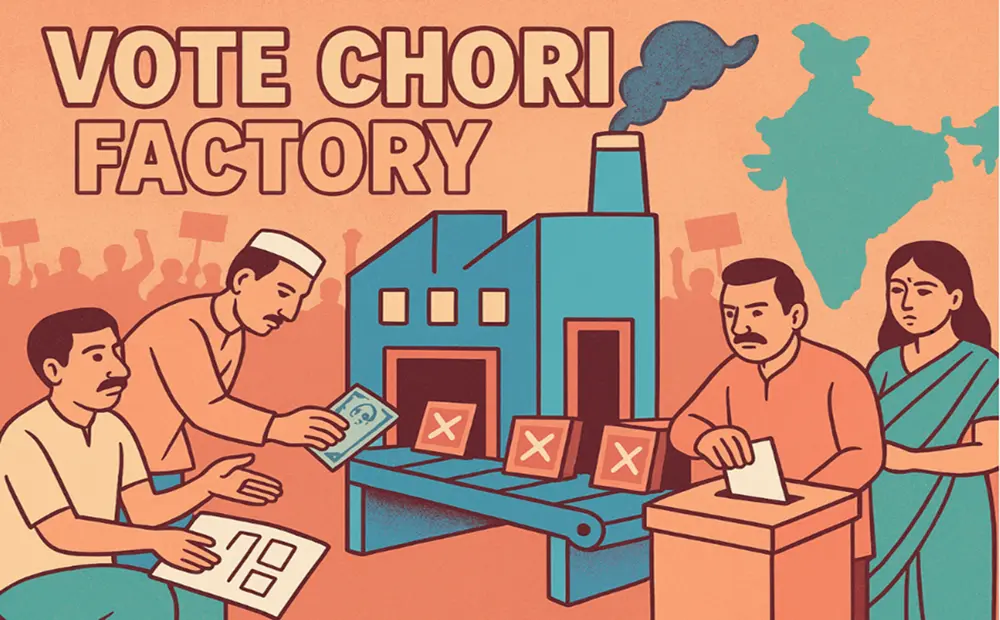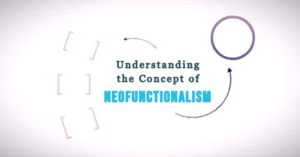Understanding Vote Chori Factory: A Sociological Analysis of Electoral Manipulation & Its Impact on Democracy
Ever wondered how some elections seem rigged from the start? Welcome to the Vote Chori Factory, where votes are stolen, manipulated, or influenced through clever tricks—from booth capturing and vote buying to viral misinformation. Even LoP Rahul Gandhi’s campaign faces challenges in this murky arena. But democracy isn’t helpless.
Understanding electoral manipulation tactics and Vote Chori Factories is crucial not just for analyzing politics but for safeguarding democratic values.
Let’s dive into the machinery of electoral manipulation, its social and political impacts, and, most importantly, how citizens can recognize, resist and fight back to protect the integrity of their vote.

Introduction – What is “Vote Chori Factory”?
When people talk about “Vote Chori”, they mean the theft or manipulation of votes—where the true will of the people gets hijacked.
The term “factory” here is not accidental. It suggests something industrial, organized, and systematic: a production line where democracy is twisted into a product of manipulation rather than a reflection of public choice.
From small villages to big cities, and from developing nations to global superpowers, concerns around electoral fraud keep resurfacing.
Sociologists see elections not just as political events but as social processes where power, identity, class, and media intersect.
Studying how elections are manipulated helps us understand who holds real power and how democracy can be weakened from within.
In this article, we’ll look at the “Vote Chori Factory” through a sociological lens. We’ll explore the many methods of manipulation, the power dynamics behind them, and the consequences they leave on society.
By the end, you’ll see how electoral fraud isn’t just about stolen ballots—it’s about the factory-like systems that mass-produce political control while eroding public trust.
Electoral Manipulation: Definition and Types
Electoral manipulation, also known as electoral fraud or vote rigging, refers to illegal or unethical methods used to change the outcome of an election. It’s not one single act, but a spectrum of practices designed to tilt the playing field.
One of the oldest tricks in the book is ballot stuffing—adding fake votes to the box. In some regions, this escalates to booth capturing, where armed groups physically take control of polling stations. Another common practice is creating ghost voters using fake IDs or names of deceased citizens.
Then there’s vote buying: politicians handing out cash, liquor, gifts, or freebies in exchange for votes. While it may seem small-scale, when done systematically, it can change entire outcomes. Voter intimidation, where citizens are threatened or pressured, is another powerful tool, especially against marginalized groups.
In the digital age, manipulation has entered cyberspace. From tampering with voting machines to spreading fake news online, technology has opened new frontiers of fraud. These varied methods may look different, but together, they make up the machinery of the “Vote Chori Factory.”
Sociological Dimensions of Vote Theft
Sociology helps us see that vote theft isn’t just about individual crimes—it’s about systems of power and inequality. At its core, electoral fraud often benefits the elites or dominant social groups. The wealthy and powerful use their influence to tilt outcomes, while marginalized communities—such as the poor, minorities, or lower castes—often suffer.
Another key dimension is patronage and clientelism. Politicians distribute money, jobs, or freebies in exchange for loyalty. This creates a relationship where voters are seen less as citizens with rights and more as “clients” dependent on political patrons.
Identity politics also plays a role. Elections are manipulated by exploiting religion, caste, ethnicity, or language, turning social differences into political control.
Media adds another layer. Through propaganda, biased reporting, or fake news, people’s perceptions are shaped to support one side—even when reality tells a different story.
The sociological lens reveals that vote chori is not random. It’s deeply linked to how power flows in society, and how those in control maintain their dominance through systematic manipulation.
The “Factory Model” of Electoral Fraud
Why call it a factory? Because electoral manipulation often functions like an industrial process. Just as factories mass-produce goods, electoral fraud can mass-produce manipulated results.
Think of it as a supply chain. At the top, political parties strategize how to bend the system. Then come the middlemen—local brokers who distribute money or freebies, mobilize voters, and coordinate illegal activities.
At the grassroots, muscle power is used: local strongmen or gangs who intimidate opponents, capture booths, or threaten voters.
In today’s era, another department has been added—the digital unit. IT cells spread propaganda, flood social media with fake news, and create echo chambers where lies feel like truth. Together, these actors create a seamless machinery that can deliver predictable results.
The “factory” metaphor is powerful because it shows how fraud isn’t accidental—it’s planned, systematic, and repeatable. Each election cycle, the same machinery is activated, fine-tuned, and scaled up.
For sociologists, this makes electoral manipulation less about individual dishonesty and more about institutionalized corruption that runs like an industry.
Voter Deletion and Electoral Fraud in India
Vote Chori Factory gained traction during public discourse around alleged large-scale voter deletions, especially in urban constituencies. The phrase evokes an image of an organized, factory-like operation where votes are “stolen” not through ballot tampering, but by removing legitimate voters from the rolls, often without their knowledge.
In the Indian context, this typically involves the misuse of Aadhaar-linked verification systems, where voters are marked as “shifted” or “duplicate” and quietly deleted. Many citizens discover this only on election day when they’re told their name is missing. Activists and researchers have pointed to patterns where minority communities, slum dwellers, and opposition strongholds are disproportionately affected.
The term was popularized through investigative campaigns and digital activism, including exposés like The Deletion Files, which revealed how opaque algorithms and flawed data matching led to disenfranchisement.
Rahul Gandhi plays a central and strategic role in the Vote Chori Factory campaign, which aims to expose and counter alleged voter roll manipulation in India. As the Leader of Opposition in Lok Sabha, he has positioned himself as the face of this movement, linking electoral fraud to rising unemployment and corruption.
Rahul Gandhi has accused the Election Commission of India for shielding “vote thieves” and presented data from constituencies like Aland (Karnataka) and Rajura (Maharashtra), where thousands of voter deletions and additions allegedly occurred using fake mobile numbers and impersonation.
Rahul Gandhi’s role blends investigation, activism, and electoral strategy, aiming to build public awareness and institutional accountability.
The Impact of Vote Chori on Democracy and Society
The effects of electoral manipulation go far beyond stolen votes. The first and most dangerous impact is the erosion of public trust. When people believe elections are rigged, they lose faith in the entire democratic process.
Second, it weakens the rule of law. If political actors can manipulate results without consequences, the legal system looks powerless, and corruption becomes normalized.
For marginalized communities, the effects are especially harsh—they often face intimidation, exclusion, or their voices being erased.
Culturally, repeated manipulation creates cynicism. Citizens begin to think, “Nothing changes, so why bother voting?” This disengagement weakens democracy further, creating a vicious cycle.
In the long run, vote theft damages not just elections but the very idea of citizenship. Democracy relies on people believing their vote matters. When that belief dies, politics becomes the game of the powerful, while ordinary people become passive spectators.
Case Studies of Electoral Manipulation
History gives us many examples of how the “Vote Chori Factory” operates in different regions.
In South Asia, booth capturing became infamous in the late 20th century, where goons physically took over polling stations. These incidents showed how muscle power can override voter will.
In Africa, cases of vote buying and intimidation remain common, with communities pressured into supporting ruling parties through fear or bribery.
Latin America has witnessed long histories of election fraud tied to military regimes and populist politics.
In the U.S. and Europe, the story is different but no less significant. The rise of digital disinformation campaigns—such as fake news during the 2016 U.S. elections or Russian meddling—shows how modern democracies are not immune.
“Vote Chori Factory” thus symbolizes a deeper crisis in Indian democracy—where technology meant to streamline elections is allegedly weaponized to suppress votes. It’s a call to demand transparency, accountability, and voter rights in the digital age.
These cases highlight a key point: electoral manipulation may look different depending on context—guns and goons in one place, algorithms and bots in another—but the underlying goal is always the same: to bend democracy in favor of the powerful.
Sociological Theories on Electoral Fraud
Different sociological theories offer unique lenses to understand vote chori.
Conflict Theory sees elections as a battleground where powerful groups exploit the weak to maintain dominance. Fraud, in this view, is simply another weapon of class struggle.
Functionalism, on the other hand, emphasizes the role of institutions. From this angle, manipulation disrupts the essential function of elections, which is to provide stability and legitimacy. A rigged election is like a broken organ in the social body.
Symbolic Interactionism zooms in on the everyday. It looks at how people perceive legitimacy. Even if fraud is proven, if citizens believe elections are fair, legitimacy is maintained—and vice versa.
Finally, postcolonial sociology reminds us that many electoral malpractices in developing nations are shaped by colonial legacies, where governance was built on manipulation, control, and suppression rather than fairness.
These theories show that electoral fraud is not just about politics—it’s about how societies are structured, how power flows, and how meaning is created around democracy itself.
Resistance and Electoral Reforms
If the Vote Chori Factory is so powerful, can it be resisted? History shows that civil society, independent media, and vigilant citizens play crucial roles. From grassroots watchdog groups to investigative journalism, many forces challenge manipulation.
Reforms are also key. Strong and independent Election Commissions can limit fraud by enforcing strict rules.
Transparency in campaign funding helps reduce the influence of money. Technology, if used wisely, can safeguard systems instead of corrupting them. For example, biometric voter IDs and blockchain voting are being explored globally.
Equally important is voter education. When citizens understand their rights and recognize manipulation tactics, they are less likely to fall prey to freebies, intimidation, or misinformation.
In some countries, public campaigns and youth-led movements have successfully reduced vote buying.
Resistance is never easy, but it is possible. The more citizens demand accountability and transparency, the harder it becomes for the “factory” to operate unchecked.
In the long run, reform is not just about fixing elections—it’s about restoring faith in democracy itself.
Conclusion – Can Democracy Survive the Vote Chori Factory?
The metaphor of a “Vote Chori Factory” captures a painful truth: electoral fraud is not accidental but organized, systematic, and deeply connected to social inequalities. It is a machine that benefits the few while silencing the many.
But democracy is resilient. Around the world, people have pushed back, demanding fair elections, better laws, and cleaner politics. The fight against electoral manipulation is not just about ballots—it’s about the soul of democracy.
Sociologically, the Vote Chori Factory is a mirror. It shows us how power is exercised, how identities are exploited, and how trust is either built or broken. Recognizing it is the first step toward dismantling it.
Ultimately, the survival of democracy depends on us. Awareness, accountability, and active citizenship are the tools that can shut down the factory. Because when votes are truly free, democracy is not just a system—it becomes a lived reality of equality, justice, and hope.
Author: Mahtab Alam Quddusi – A Passionate Writer, Blogger, Social Activist, Postgraduate in Sociology and Social sciences and Editor of The Scientific World.




